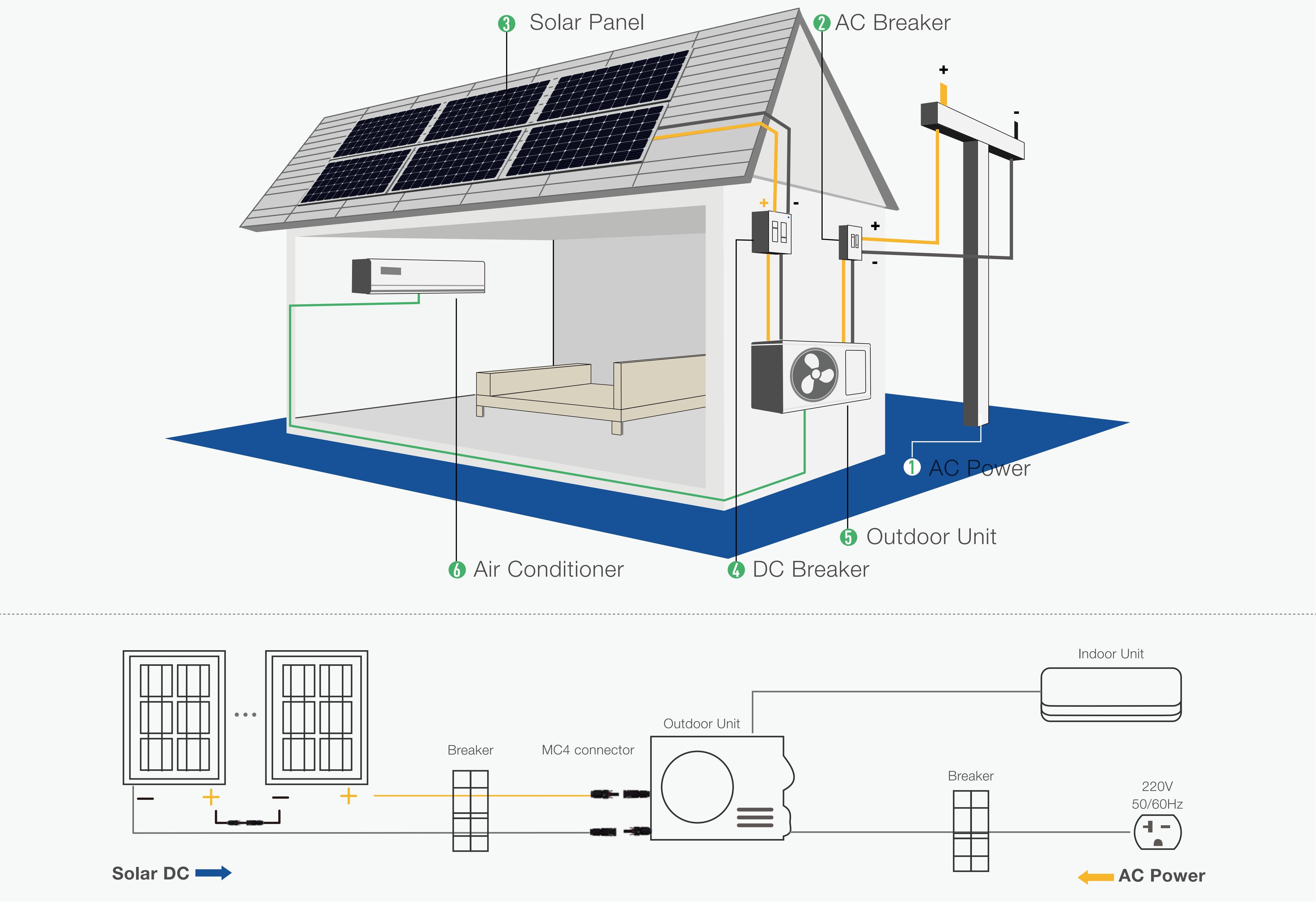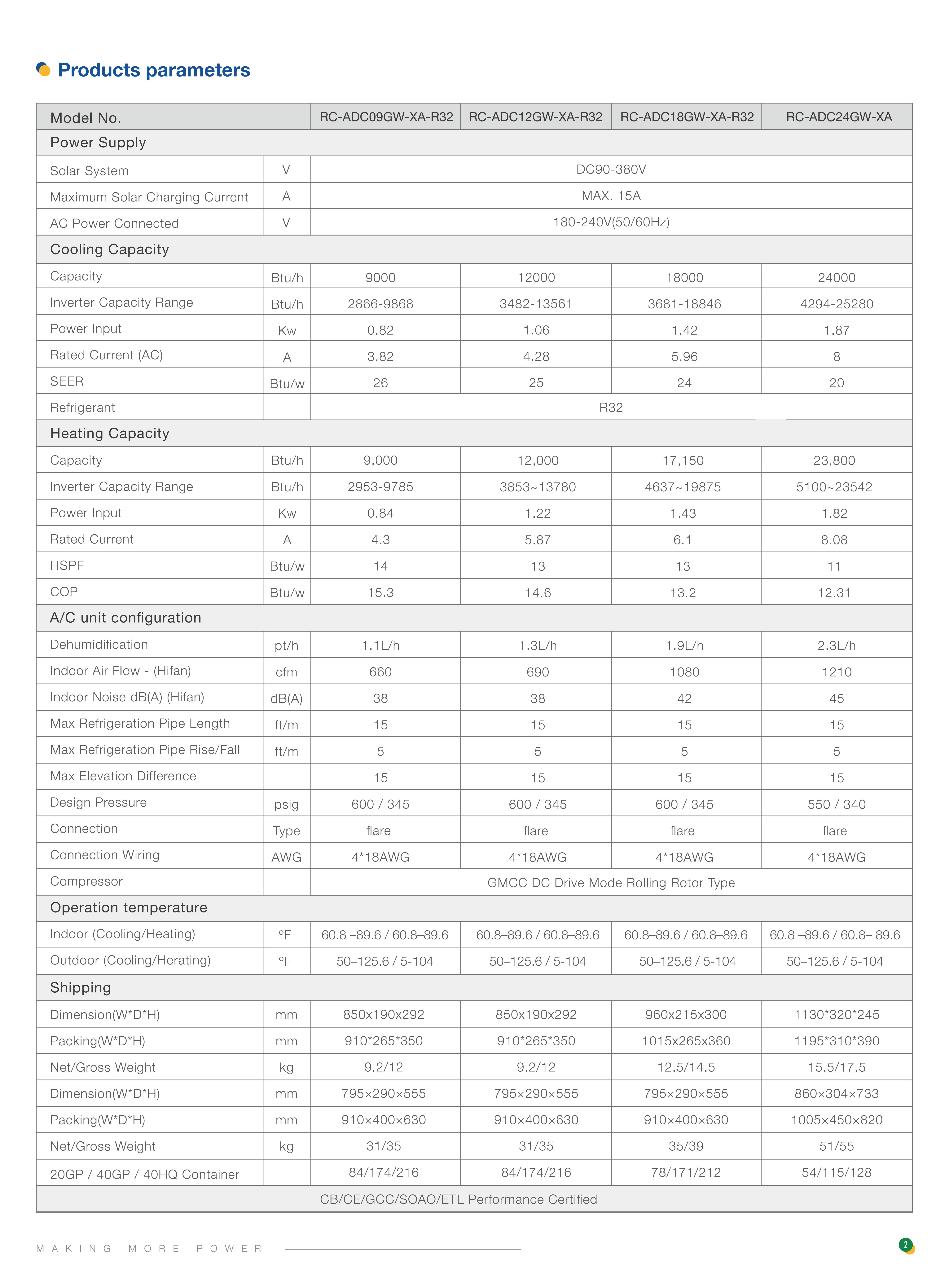A solar air conditioner is a type of air conditioning system that utilizes solar energy to power its operation. It operates in a similar way to a traditional air conditioner, but instead of relying solely on electrical power from the grid, it harnesses solar energy to reduce its energy consumption and environmental impact.
Solar panel voltage:
DC90-380VMaximum Solar Charging Current:
15AAC Power Connected:
180-240V(50/60Hz)Refrigerant:
R32Compressor:
GMCC DC Drive Mode Rolling Rotor TypeConnection:
Flare
Here's a general overview of how a typical home solar air conditioner works:
Solar Panels: The system consists of solar panels installed on the roof or any suitable location where they can receive maximum sunlight. These solar panels convert sunlight into electrical energy using photovoltaic (PV) cells.
Energy Conversion: The electrical energy generated by the solar panels is converted from direct current (DC) to alternating current (AC) using an inverter. AC is the standard form of electricity used in most homes and appliances.
Compressor and Refrigerant: The solar air conditioner utilizes a compressor and a refrigeration cycle to cool the air. The compressor pressurizes and circulates the refrigerant, typically a gas such as R410A, within the system.
Evaporator and Condenser: The system consists of an evaporator and a condenser coil. The evaporator coil absorbs heat from the indoor air and cools it down, while the condenser coil releases the heat absorbed from the indoor air to the outside environment.
Solar Power Integration: The solar power generated by the solar panels is used to run the compressor and other electrical components of the air conditioner. This reduces the need for grid electricity and helps lower energy costs.
Energy Storage (Optional): In some cases, a solar air conditioner may be integrated with an energy storage system, such as batteries, to store excess solar energy generated during the day. This allows the system to continue running during periods of low or no sunlight, such as during the night or on cloudy days.
By utilizing solar energy, a solar air conditioner helps reduce electricity costs and dependence on the grid, while also reducing greenhouse gas emissions associated with traditional air conditioning systems. It is an environmentally friendly option for cooling homes and buildings.

A solar air conditioner, also known as a solar-powered air conditioner or solar cooling system, utilizes solar energy to power its operation. Here's a general overview of how a solar air conditioner works and some advantages it offers over conventional air conditioners:
Solar panel system: Solar air conditioners have an integrated solar panel system that captures sunlight and converts it into electricity. The panels are typically installed on the roof or any suitable location with maximum exposure to sunlight.
Power generation: The solar panels generate DC (direct current) electricity from the sunlight. This electricity is then utilized to power the air conditioner's compressor, fans, and other internal components.
Inverter technology: Solar air conditioners often employ inverter technology, which allows for more efficient operation. The inverter converts the DC electricity from the solar panels into AC (alternating current) electricity, which is used to run the air conditioner's motor and compressor.
Cooling process: The cooling process of a solar air conditioner is similar to that of a conventional air conditioner. The refrigerant absorbs heat from the indoor environment and transfers it outside, cooling the indoor space. The air conditioner's fans distribute the cooled air throughout the room.

Advantages of solar air conditioner compared to common air conditioners:
Energy efficiency: Solar air conditioners are highly energy-efficient because they use renewable solar energy as their power source. This can significantly reduce electricity consumption and lower utility bills, especially in areas with abundant sunlight.
Environmentally friendly: Solar air conditioners help reduce carbon footprint since they use clean and renewable energy. By relying on solar power instead of electricity from the grid, they contribute to the reduction of greenhouse gas emissions.
Lower operating costs: While the upfront cost of installing a solar air conditioner may be higher, the long-term operating costs are generally lower. The savings on electricity bills can offset the initial investment, making solar air conditioning a cost-effective choice in the long run.
Off-grid capabilities: Solar air conditioners can operate independently of the electrical grid when equipped with battery storage systems. This feature is especially valuable in areas with unstable or no access to the grid, allowing continuous cooling even during power outages.
Durability and reliability: Solar air conditioners are often designed to be robust and reliable. They have fewer moving parts, reduced maintenance requirements, and can withstand power fluctuations, making them more durable and less prone to failure.
Potential for government incentives: In some regions, there may be government incentives, tax credits, or rebates available for installing solar-powered systems, including solar air conditioners. These incentives can further reduce the overall costs of the system.
It's worth noting that the efficiency and performance of solar air conditioners can vary depending on factors such as the solar panel capacity, system design, climate conditions, and specific product specifications. It's recommended to consult with a professional installer or manufacturer to determine the most suitable solar air conditioner for your specific needs and location.
FAQs:
Q1: Do you support OEM/ODM?
A:Definitely, OEM&ODM service is supported with a certain quantity,including customize logo,package and label;
Q2: What's the production time?
A: The production time is normally 15 working days. but we will always prepare some stocks for popular models.
Q3: Can you provide DDP service?
A:Yes, if you are a personal customer and don't want to deal with the customs, we can provide DDP service to your address.
Q4: What about the warranty and how to claim?
A: Warranty period are 5 years since you receive the product, our professional after-sales team will deal with all warranty issues.